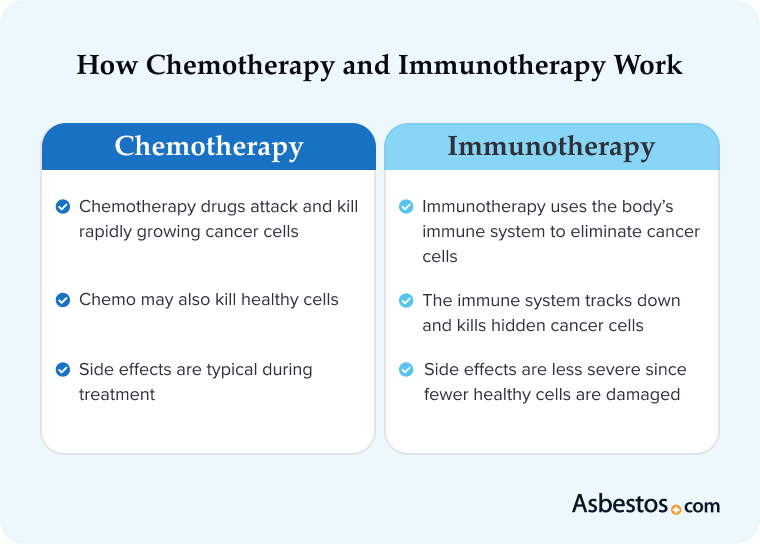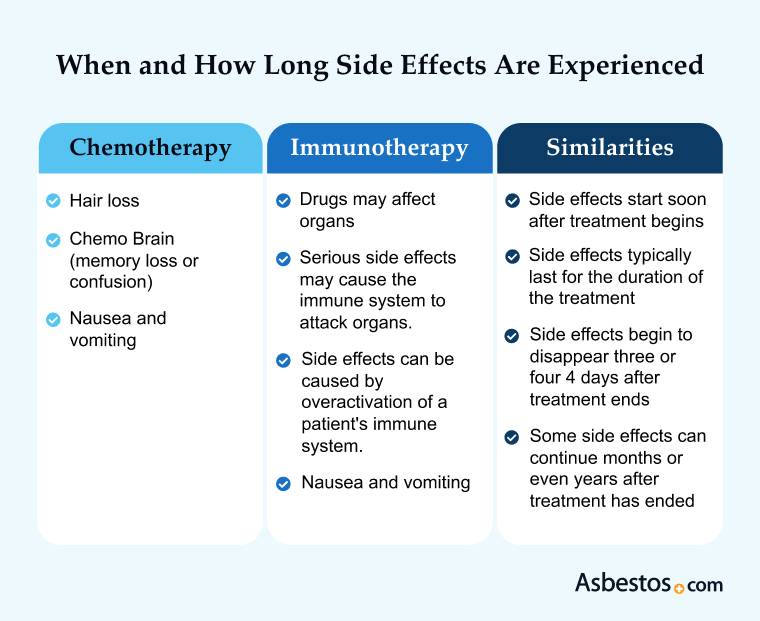Immunotherapy vs. Chemotherapy
Chemotherapy and immunotherapy are both systemic treatments for cancer that work by distributing certain drugs throughout the body. When recommending immunotherapy vs. chemotherapy to treat mesothelioma, specialists consider the individual patient as well as the type and stage of the disease.
Written by Dr. Chelsea Alvarado • Edited By Walter Pacheco
Asbestos.com is the nation’s most trusted mesothelioma resource
The Mesothelioma Center at Asbestos.com has provided patients and their loved ones the most updated and reliable information on mesothelioma and asbestos exposure since 2006.
Our team of Patient Advocates includes a medical doctor, a registered nurse, health services administrators, veterans, VA-accredited Claims Agents, an oncology patient navigator and hospice care expert. Their combined expertise means we help any mesothelioma patient or loved one through every step of their cancer journey.
More than 30 contributors, including mesothelioma doctors, survivors, health care professionals and other experts, have peer-reviewed our website and written unique research-driven articles to ensure you get the highest-quality medical and health information.
About The Mesothelioma Center at Asbestos.com
- Assisting mesothelioma patients and their loved ones since 2006.
- Helps more than 50% of mesothelioma patients diagnosed annually in the U.S.
- A+ rating from the Better Business Bureau.
- 5-star reviewed mesothelioma and support organization.
Testimonials
My family has only the highest compliment for the assistance and support that we received from The Mesothelioma Center. This is a staff of compassionate and knowledgeable individuals who respect what your family is experiencing and who go the extra mile to make an unfortunate diagnosis less stressful. Information and assistance were provided by The Mesothelioma Center at no cost to our family.LashawnMesothelioma patient’s daughter
How to Cite Asbestos.com’s Article
APA
Alvarado, C. (2024, May 1). Immunotherapy vs. Chemotherapy. Asbestos.com. Retrieved May 1, 2024, from https://www.asbestos.com/treatment/immunotherapy-vs-chemotherapy/
MLA
Alvarado, Chelsea. "Immunotherapy vs. Chemotherapy." Asbestos.com, 1 May 2024, https://www.asbestos.com/treatment/immunotherapy-vs-chemotherapy/.
Chicago
Alvarado, Chelsea. "Immunotherapy vs. Chemotherapy." Asbestos.com. Last modified May 1, 2024. https://www.asbestos.com/treatment/immunotherapy-vs-chemotherapy/.
What Are Chemotherapy and Immunotherapy?
Chemotherapy and immunotherapy are two classes of drugs used to treat many types of cancer and other illnesses. These classes are distinct from one another based on how they work.
- Chemotherapy: Chemical agents used to treat disease and/or as cytotoxic (cell-killing) drugs used to destroy or block the replication of cancer cells
- Immunotherapy: A treatment type that involves activation or suppression of the immune system to prevent or treat disease
Understanding how these two treatment types differ can help people diagnosed with cancer feel more informed about chemotherapy vs. immunotherapy in the treatment of cancer.
How Do Chemotherapy and Immunotherapy Work?
Chemotherapy and immunotherapy are both systemic treatments that work by traveling throughout the body to target cancer, though their particular mechanisms are different.
The goal of chemotherapy is to block a tumor’s ability to grow and spread. Most chemotherapy drugs achieve this goal by interfering with the synthesis stage of the cell cycle, which is the process of a cell becoming fully mature. During the synthesis phase, the cell makes important molecules for its survival, including DNA. Cancer cells tend to go through the cell cycle more rapidly than healthy cells, making them an ideal target for chemotherapy drugs.

Immunotherapy treats cancer by affecting the immune system. This is the group of organs in the body that recognizes and kills foreign substances, including infections and cancer cells. Some immunotherapy drugs work by boosting the immune system. Others act like a component of the immune system to improve how it works.
Chemotherapy and Immunotherapy Side Effects
Although chemotherapy and immunotherapy work differently to treat cancer, they share many side effects, with the most common being fatigue and flu-like symptoms.
- Appetite changes
- Chills
- Confusion
- Constipation
- Cough
- Diarrhea
- Difficulty breathing
- Fatigue
- Fever
- Hair thinning or loss
- Headaches
- Heart palpitations
- High blood pressure
- Infections
- Inflammation
- Joint pain
- Low blood pressure
- Muscle pain
- Nausea
- Peripheral neuropathy (painful nerve problems in the arms and legs)
- Rash
- Trouble concentrating, understanding and speaking
- Vomiting
- Weakness
Chemotherapy can cause many side effects because these drugs can’t tell the difference between healthy, rapidly growing cells and cancer cells. Immunotherapy side effects most often result from increased immune system effects.
When Side Effects Begin and How Long They Last
Overall, chemotherapy side effects tend to occur quickly after a dose but be shorter-lasting than those of immunotherapy drugs.

Immunotherapy side effects are less predictable but can be long-term and may persist even after the end of the treatment. Each patient will have a different experience with either treatment type and should consult with their doctor about their specific side effects.

Which Is More Effective?
The most effective treatment depends on the individual patient’s age and fitness and the type or stage of mesothelioma. All cancer treatment depends on the person and the cancer type. For mesothelioma, treatment efficacy is based on clinical trials that compare different treatment strategies.
- Combined chemotherapy (pemetrexed plus cisplatin or carboplatin) is recommended either before or after surgery for people with operable mesothelioma.
- Combined immunotherapy (nivolumab plus ipilimumab) is recommended as the first-line treatment of inoperable pleural mesothelioma, regardless of cell type.
- Cytoreductive surgery with hyperthermic intraperitoneal chemotherapy, or HIPEC, is a treatment option for peritoneal mesothelioma patients.
- Data are lacking about which treatment is most effective for treating recurrent mesothelioma. Based on available evidence, the National Comprehensive Cancer Network guidelines recommend either pemetrexed plus cisplatin/carboplatin or nivolumab with or without ipilimumab.
The current guideline recommendations for mesothelioma treatment reflect the importance of individualizing treatment strategies.
Benefits of Combined Immunotherapy and Chemotherapy Treatment
Researchers have found that immunotherapy works better for treating certain cancers when combined with other therapy types. Although current United States guidelines for pleural mesothelioma treatment recommend either chemotherapy or immunotherapy, researchers are investigating the potential benefit of combined therapy.
- A recent clinical trial found survival benefits from combined chemotherapy and immunotherapy when used to treat inoperable mesothelioma. In this study, people lived 7.6 months longer (20.4 months compared to 12 months) than previously seen for similar patients.
- Combined chemotherapy and immunotherapy may provide the greatest benefit when cancers don’t respond to immunotherapy alone.
- Combined chemotherapy and immunotherapy cause side effects similar to single-drug treatment. Fortunately, they’re generally mild and well-tolerated by participants in clinical studies.
For people with mesothelioma, determining the best treatment plan requires working with a mesothelioma specialist. Specialists can help create the safest treatment strategy based on an individual’s medical history and current disease status.
Clinical trials of new treatments for mesothelioma are ongoing across the country. Enrolling in a clinical trial can offer mesothelioma patients access to the latest treatments.

Common Questions About Immunotherapy vs. Chemotherapy
- Is there a cost difference between immunotherapy and chemotherapy?
-
The cost of immunotherapy vs. chemotherapy varies based on the length of treatment, the type of cancer and its stage, but chemotherapy is generally less expensive than immunotherapy. Based on a 2020 study focused on the treatment of non-small cell lung cancer, chemotherapy in 2016 cost $147,801 while immunotherapy cost $202,202.
People should always talk about costs with their doctors. If insurance doesn’t cover cancer treatment costs, doctors’ offices can often assist with finding financial assistance. The Mesothelioma Center works with mesothelioma patients to find financial assistance for their treatment.
- Are there differences in the length of treatment time?
-
The length of treatment with chemotherapy or immunotherapy varies by cancer stage, cancer type and potential side effects. People with advanced pleural mesothelioma usually receive two years of immunotherapy. Chemotherapy for pleural mesothelioma typically lasts five months.
- Is immunotherapy, chemotherapy or a combination recommended depending on mesothelioma type?
-
Combined chemotherapy and immunotherapy aren’t currently recommended to treat mesothelioma. For epithelioid pleural mesothelioma, either chemotherapy or immunotherapy is the preferred first-line therapy. For biphasic or sarcomatoid pleural mesothelioma, experts recommend immunotherapy. Chemotherapy is approved for peritoneal mesothelioma, but immunotherapy hasn’t been approved for this type yet.
- Does the recommended therapy depend on your mesothelioma stage?
-
Yes, mesothelioma treatment depends on the stage. People with earlier-stage disease may be eligible for surgery combined with chemotherapy and/or radiation. People with more advanced mesothelioma usually aren’t surgical candidates, and first-line treatment is systemic therapy.







